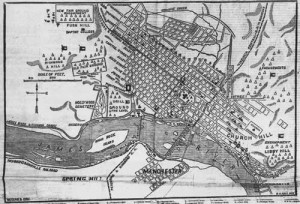As the year draws to a close, a total of eleven Baptist churches are active in the Confederate capital city of Richmond, Virginia, including three African churches. A number of the urban congregations have, by this time, settled into a weekly routine of Sunday AM, Sunday PM, and Wednesday PM services that will remain familiar to Baptists of the South for generations to come. The African congregations are an exception to this pattern: slaves work all day six days a week, their only day off being Sunday.
Church names, pastors and worship times are as follows:
First – Rev. J. Lansing Burrows, Pastor – services, 11 A. M., and 7½ P. M., and Wednesday, 7½ P. M. Communion, third Sunday, 3½ P. M.
Second – Rev. L. W. Seely, Pastor – services, 11 A. M., and 7½ P. M., and Wednesday, 7½ P. M. Communion, last Sunday, 11 A. M.
Grace Street – Rev. J. B. Jeter, Pastor – services, 11 A. M., and 7½ P. M., and Wednesday, 7½ P. M. Communion, third Sunday, 11 A. M.
Leigh Street – Rev. J. B. Solomon, Pastor – services, 11 A. M., and 7½ P. M., and Wednesday, 7½ P. M. Communion, third Sunday, 11 A. M.
Clay Street – Rev. E. J. Willis, Pastor – services, 11 A. M. Communion, third Sunday, 11 A. M.
Sidney – Rev. ___ Deshaver, Pastor – services, 11 A. M.
Rocketts – Rev. Thomas Binford, Pastor – services, 11 A. M.
Belvidere – Rev. Wm. H. Fonerden, Pastor – services, 11 A. M., and 7½ P. M.
First African – Rev. Robert Ryland, Pastor – services, 11 A. M., and 3¾ P. M.
Second African – Rev. H. W. Watkins, Pastor – services, 11 A. M., and 3¾ P. M.
Third African – Rev. W. T. Lindsey, Pastor – services, 11 A. M., and 3¾ P. M.
Signifying the popularity of the Baptist faith among slaves, only one other African church is active in Richmond, and it is a Methodist congregation. Among lesser represented faiths in the Confederate capital are three Catholic churches, three Jewish synagogues, two Lutheran congregations, one Christian congregation, one Disciples church, one Quaker society, and one Universalist congregation.
Source: “Church Services,” Richmond Dispatch, December 7, 1861 (link)



